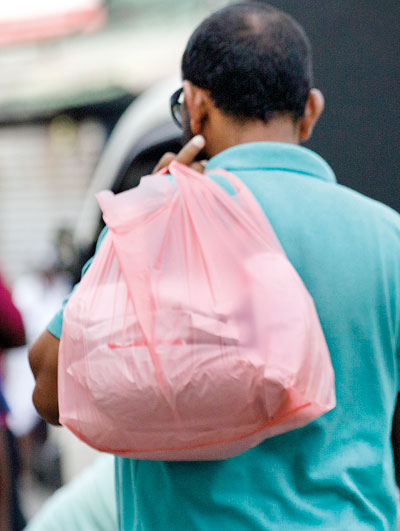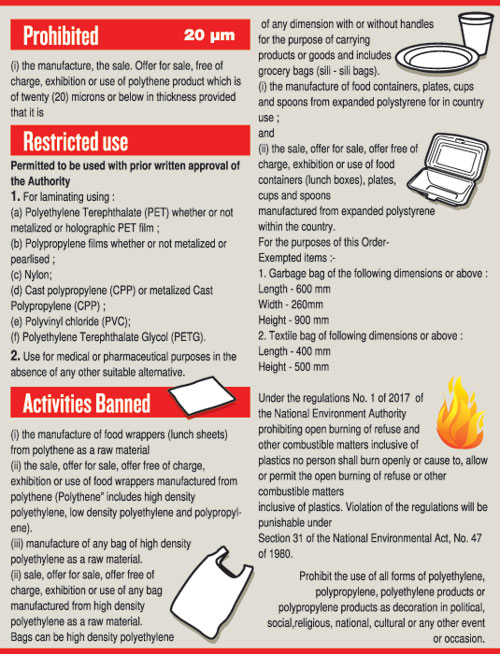News
Sri Lankans create hope, but canteens and polythene industry defiant
Some Sri Lankans with a social consciousness are creating ripples of hope of reducing the mountains of polythene waste, while owners of eateries who add millions of lunch sheets into the garbage piles every day are becoming defiant following the ban on polythene and plastic in all their forms.

Owners of small-scale eateries claim there are no good alternatives to polythene lunch wrappers. Pic by Sameera Weerasekera
The Sunday Times has noticed some Sri Lankans who cared to bring their own bags and chose to use fewer polythene bags at supermarkets and malls. Some Sri Lankans though have been captured on TV networks openly being cynical, shrugging their shoulders and collecting as many polythene bags for vegetables, fruit and meats at wet markets in their localities.
Some malls are also continuing to ignore the ban and the destruction the country is facing because of the polythene menace. At other malls, the use of environmentally-friendly bags was being encouraged with incentives.
Owners of small-scale eateries claim there are no good alternatives. They also say the alternative wrappers can’t hold curries and are costly. For diners they have raised prices by Rs 10 to cover the cost of water that will be used to wash plates and they are also angling to raise prices of take-away food.
“The revised price of takeaway lunch parcels, cakes and pastry items will be decided soon,’’ said Asela Sampath, the president of the The All Island Canteen Owners Association.
Canteen owners are continuing to use low density polythene lunch sheets and say their stocks will last for three months.
The canteen owners are not pleased.
“Lunch sheets are important for our businesses. At least the government should have spared the lunch sheets from the ban,’’ Mr Sampath said. He said 12 million lunch sheets are used every day.
The group said it wants talks with the Central Environment Authority on “other alternatives’’.
Sampath said the group will protest in solidarity with the polythene and plastic industry including manufacturers, importers and wholesalers.
“If no solutions are offered, we will strike. We have set the day for 15 September. All eateries and canteens will be closed,’’ he warned.
The Polythene Manufacturers and Recyclers Association said that although the Cabinet gave the industry until 1 January 2018, the Central Environment Authority has said that it will be immediately clamping down.
Chairman, Anura Wijetunga, called the sudden ban unfair.
He said that manufacturers have imported raw materials for three months.
“We have obtained loans from banks and our properties are under mortgage. This move will break us,’’ he claimed.
He did not provide any data on commercial loans or mortgages.
“We will wait and see how the people are going to manage without polythene bags and the lunch sheets,” he dared.
In a series of gazette notifications under No 47 of 1980 (six in all) the Government has prohibited the use of polyethylene, polypropylene and their products in all forms.
The manufacture of food wrappers from polythene as raw material is prohibited. Also the sale/offer to sell or free distribution of lunch sheets, polythene products containing low and high density polythene and polypropylene of 20 micron or below thickness has been banned.
However businesses in the laminating and pharmaceuticals sector are exempted and will be allowed to use 20 micron or below 20 micron materials with the permission of the CEA.
The use of polythene in decorations for political, social, religious, cultural, or national events is banned.
Manufacturing of plates, cups, containers, and spoons from expanded polystyrene has been included.
Among the activities banned, include manufacturing of bags of low and high density polyethylene (shopping bags) and displaying them for sale or use.
Under the National Environmental Regulation No 1 of 2017, burning of plastic in public is banned.
The CEA said violators of the law will be prosecuted.
Deputy director general, J M U Indraratne, said non-compliant industries will be will be charged under the National Environmental Act of 47/1980. “They can face up to 2 years imprisonment and/or up to Rs. 10,000 fine.
He said the CEA will set up a plan to monitor compliance, next week.
However, users of polythene bags and lunch sheets will go scot free and will be given time to phase out. “When there is no manufacturing, the product will fade away,’’ he said.
The polythene industry said it is watching how compliance will work.
“The SLFP 66th annual convention is on the 2nd of September. Decorations will be plentiful and food will be served in abundance. It would be interesting to see how they would improvise without the ubiquitous polythene,’’ the industry group said.

